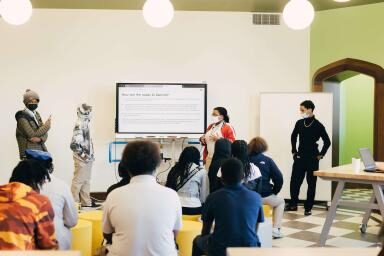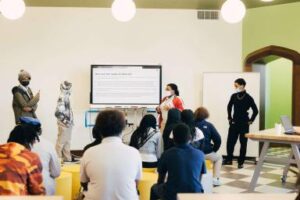
Students at the School at Marygrove.

Students at the School at Marygrove.
How do you make sure that growth is good?
This was the overarching question students at The School at Marygrove explored for their final projects about creating equitable growth in their hometown of Detroit. It was the culminating assignment for the economics class taught by lead teacher Brandon Moss and student teacher Hunter Janness.
The students’ work wasn’t just for a grade: they were speaking directly to Detroit City Councilmember Angela Whitfield Calloway. Whitfield Calloway—a graduate of Cooley High School who went on to earn degrees from Spelman College and Detroit College of Law—is a former adult education instructor, human resources administrator, hearing officer, and lifelong Detroiter. Although the students in class are too young to vote, Whitfield Calloway believes these students’ voices are as critical as any of her constituents.
The students formed groups, with each one researching a different area they saw as crucial to equitable economic development in Detroit. Topics included access to housing, mitigating air pollution, fixing roads, encouraging small businesses, improving bus infrastructure, and reintegrating Detroiters who have been incarcerated.
“I have not seen teenagers so engaged in identifying problems in their city and fiercely, confidently pursuing solutions,” says Whitfield Calloway. The councilwoman enthusiastically encouraged each group and followed up with questions that pushed the students’ thinking even further.
One group, whose project was titled “Housing in the D,” discovered that more than 1,000 people became homeless during the COVID-19 pandemic, and over 300 of Detroit’s currently unhoused individuals are under the age of 18. According to the students, the city’s 26 shelters can’t meet the demand. Families without secure housing struggle to participate in the economy and the educational system. Their team proposed investing in housing and supports particularly designed for single mothers facing homelessness.
Several other groups presented on various aspects of transportation in Detroit, including road conditions that impinge on the local economy; Detroiters who struggle to get to work because they can’t afford gas, vehicle maintenance, and insurance; and buses that aren’t perceived as being safe or clean. Their solutions ranged from AI-powered road condition monitoring to crowdsourced data on public transit.
If this doesn’t sound like a typical high school economics class, that’s because it isn’t. However, the students are showing mastery of terms such as GDP, supply, demand, profit, and opportunity cost, among many other common economics concepts. “Rote memorization teaches you an accepted framework within economics but it doesn’t teach you to think ‘economically,’” says Janness.
Read more here.

